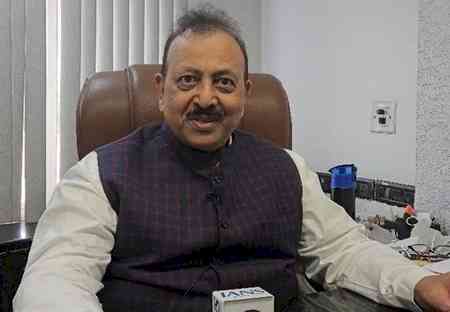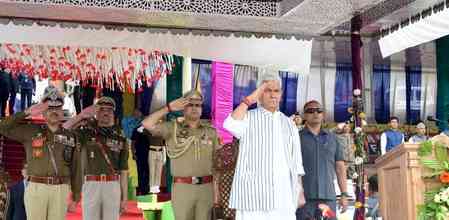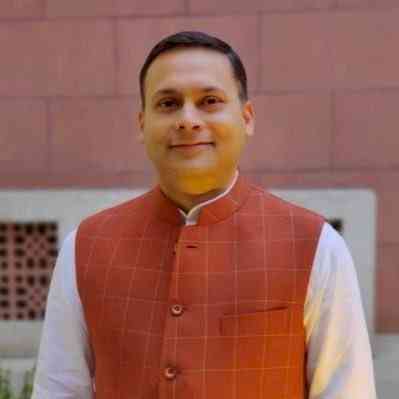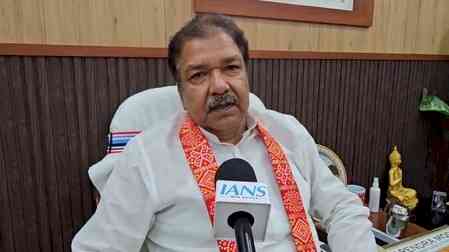PM Modi spoke on Jainism with depth even greater than a religious scholar: Rajendra Shah
Chairman of SAL Hospital & Medical Institute, Rajendra Shah praised Prime Minister Narendra Modi’s deep and nuanced understanding of Jain philosophy, as demonstrated during his speech at the ‘Navkar Mahamantra’ Day celebrations organised by Jain International Trade Organisation (JITO) in Delhi on April 9.

Ahmedabad, April 11 (IANS) Chairman of SAL Hospital & Medical Institute, Rajendra Shah praised Prime Minister Narendra Modi’s deep and nuanced understanding of Jain philosophy, as demonstrated during his speech at the ‘Navkar Mahamantra’ Day celebrations organised by Jain International Trade Organisation (JITO) in Delhi on April 9.
He said: "The Prime Minister brought divine energy to the chanting of the Navkar Mantra. His presence transformed the atmosphere entirely. The way he explained the essence of Jainism was even more articulate than what one would expect from a religious scholar. His knowledge is not something an ordinary person could express. Only someone with a rare divine power can speak with such depth and insight about a faith."
Rajendra Shah further recalled: "I was the first person to publicly declare in 2002 that Modi Ji has the qualities of a Yugpurush (a person of the era). Just as a great soul like Mahatma Gandhi appears once in a century, Modi Ji too has that divine energy. And now, everyone can see for themselves that he truly is a Yugpurush. No one else could have delivered such a profound and spiritually resonant speech. The way he spoke about Jainism could only come from someone with a divine mission.”
Shah said that the Prime Minister's remarks were not only spiritually moving but also rooted in the vision of universal welfare.
“He spoke about collective well-being—about doing good for all, for the world. He shared nine resolutions Nav Sankalp, encouraging people to adopt them in their lives to make India number one. I am sure if all adopt these sankalps India would be number one”
Highlighting PM Modi’s emphasis on economic self-reliance, Shah said: "The Prime Minister urged people to embrace indigenous products to reduce dependency on foreign goods. He linked this to reducing unemployment and strengthening the economy. He gave a very simple yet impactful example—planting a tree in your mother’s name (Ek ped Maa ke naam). This can reduce energy consumption by 20 per cent, as trees help lower temperatures. It’s a simple act but with profound economic implications.”
Shah recounted a personal conversation where PM Modi raised the concern that India, despite being an agriculture-based country, still imports food oils worth Rs 1 lakh crore. "He asked, 'Can we call ourselves an agriculture-based nation if we’re importing food oil at such a massive scale?' He advocated for reduced oil consumption for better health and to save Rs 10,000–20,000 crore annually, contributing to national development."
"He even urged me to tell my friends not to hold weddings abroad. He said, ‘Why not marry within India? So much of our money goes abroad. Visit foreign countries if you like, but celebrate your special moments here and visit places in our country.’ His point was clear—spending domestically will boost employment and reduce poverty."
Shah admired how PM Modi’s entire message was centred on nation-building, driven by compassion, patriotism, and service to humanity, values that lie at the core of Jainism.
"He explained the fundamental principle of Jainism—that helping the poor is the true essence of religion. He connected Jain values with environmental consciousness, emphasising that every living being has a right to live. He spoke of non-violence, a core tenet of Jainism, and delved deeply into the nine aspects of the Navkar Mantra, even explaining the meaning of 'Arihant' in detail."
He fondly recalled that PM Modi had laid the foundation for JITO.
"He was the chief guest at our very first event—even before the name JITO was finalised. The small seed he planted has grown into a mighty banyan tree. I am truly amazed by his knowledge of religion—this level of wisdom is not found in ordinary individuals."
Shah also expressed his views on the Jain community's identity.
"I personally don't agree with the notion that the Jain community is a minority. I believe it's a misconception. In school records, Jains used to write ‘Hindu’ as their religion. All the Tirthankaras were Rajput kings—Hindus. Just like Vaishnavism or other sects, Jainism is also a spiritual path within the broader Hindu fold. Jains are the intellectual backbone of our society.”
He concluded by saying: “Where there is a community of such capable and self-sufficient individuals, they do not look to the government for support. Their strength lies in giving, not asking. The foundational principle is to keep people happy and free from expectations.”


 IANS
IANS 










